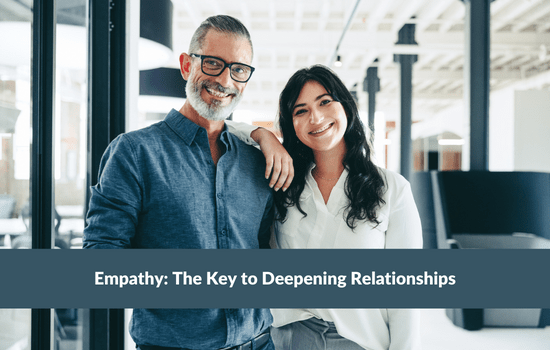Empathy is a bridge to deeper connections and lasting relationships. It is crucial in emotional intelligence as it goes hand in hand with compassion to cultivate strong and meaningful relationships.
Enhancing Relationships Through Empathy: A Pathway to Understanding
How is Empathy Connected to Emotional Intelligence?

Empathy is considered a foundational component of emotional intelligence. Emotional intelligence (EI) refers to the ability to recognize, understand, and manage one's own emotions, as well as to recognize and understand the emotions of others. Empathy plays a crucial role in the latter aspect of EI, which involves perceiving and understanding the emotions of others.
What is Empathy?
Empathy is the capacity to recognize and understand others’ feelings and opinions. This ability means figuratively walking in their shoes or seeing things through their eyes, understanding their feelings, and responding with compassion and understanding. It involves recognizing emotions, demonstrating compassion, and genuinely caring about the other person's experiences.
By practicing empathy, individuals can enhance their emotional intelligence by developing stronger interpersonal skills, improving communication, and fostering deeper connections. Empathy helps build trust, promotes better collaboration, and contributes to healthier and more fulfilling relationships.
While empathy is a significant component of emotional intelligence, it is notable that it encompasses other aspects, such as self-awareness, self-regulation, social skills, and motivation. Together, these elements contribute to overall emotional intelligence and play a vital role in personal and social well-being.
Can Empathy Be Taught and Learned?
Without question, empathy can be taught and learned. While some people may naturally possess higher levels of compassion, empathy skills can be developed and enhanced through education, practice, and experience. Empathy involves understanding and sharing the feelings of others, which can be cultivated through activities such as active listening, perspective-taking exercises, and engaging in acts of kindness and compassion. Various educational programs, workshops, and therapy approaches also focus on teaching empathy to individuals of all ages. So, with effort and practice, one can increase their empathetic abilities.
Using Empathy to Connect to Others.
Knowing how to communicate with others is imperative regarding personal and professional relationships. We must try to view everyone as unique and different and take the time to get to know them and build a connection. Through my consulting on employee conflict resolution, I found one of the significant challenges is the great difficulty many have relating to each other. In particular, their inability to understand each other’s perspectives.
Generally, people aren't out to hurt, provoke or aggravate their colleagues. Most often, they struggle to put themselves in their colleague’s shoes. Sometimes we feel so strongly and passionately that we aren’t able or willing to step back and consider another’s rationale or point of view.
Did you know the power of empathy also plays a vital role in reducing mental health stigma? Learn more here.
How Can Empathy Improve Relationships?
Incorporating these strategies into your interactions can help build and retain relationships:
- Active Listening: Practice active listening by giving your full attention to the other person, maintaining eye contact, and truly understanding their perspective without interrupting or jumping to conclusions.
- Put Yourself in Their Shoes: Try to understand the other person's emotions, thoughts, and experiences by imagining yourself in their situation. This strategy helps create empathy and fosters a deeper connection.
- Validate Feelings: Acknowledge and validate the other person's feelings, even if you may not fully understand or agree with them. This behaviour shows empathy and helps the person feel heard and understood.
- Show Compassion: Express compassion by offering support, understanding, and kindness to the other person. Small gestures of empathy can go a long way in strengthening relationships.
- Practice Non-Judgment: Suspend judgment and refrain from criticizing or making assumptions about the other person. Approach conversations and situations with an open mind, allowing empathy to thrive.
- Ask Open-Ended Questions: Encourage the other person to share more about their thoughts and feelings by asking open-ended questions. This action demonstrates genuine interest and helps you better understand their perspective.
- Respond with Empathy: Respond to the other person's emotions with empathy, showing that you understand and care about their experiences. Use phrases like, "I can imagine that must be difficult for you" or "It sounds like you're feeling really frustrated."
- Practice Emotional Intelligence: Develop your emotional intelligence by becoming more aware of your emotions and how they affect your interactions. This self-awareness enables you to better understand and empathize with others.
- Seek Common Ground: Look for shared experiences, values, or interests that can serve as a basis for connection. Finding common ground helps build rapport and empathy between individuals.
- Practice Self-Reflection: Regularly reflect on your empathetic abilities and improvement areas. Being self-aware and actively working on enhancing your empathy can have a positive impact on your relationships.
You'll also want to work on conflict resolution, to improve your relationships,
Remember, building empathy and compassion is an ongoing process that requires patience and practice. It will improve your professional and personal relationships and emotional intelligence. You can find practical tips to strengthen your EI in my book, The Power of Emotion. Are you ready to learn more about leading with emotional effectiveness, empathy, and compassion? Click here to learn more about my one-day intensive EI workshop for leaders.
This article was originally published on July 29, 2017, and has been updated (July 2023).
More Motivational Reads Here »
How Emotionally Intelligent Are You?
Sign up for Linda’s monthly tips to build your Emotional Intelligence and reduce Emotional Hijacking!

















